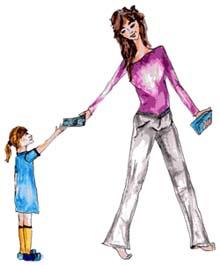 Teaching your kids about anything in this world is difficult. Where do you begin? Do you start with “the birds and the bees?” Or, worse yet, how embarrassing is it when you discover your 11-year-old knows more about the topic than you do?!
Teaching your kids about anything in this world is difficult. Where do you begin? Do you start with “the birds and the bees?” Or, worse yet, how embarrassing is it when you discover your 11-year-old knows more about the topic than you do?!
Should you start with math? Forget it. I haven’t added numbers without a calculator since 1986. And geography: I know I didn’t do so well in this arena because my 35-year-old daughter still thinks New York and Chicago are right next to one another.
And yet, if we do not teach our children about finances and investing, where will they learn? Will they make the same mistakes we’ve made … and isn’t it our job as parents to prevent this from happening as much as we can?
If the answer is yes, if we’re given the mandate to teach our children how to manage their money, there is something that strikes me as of the utmost importance: we need to know how to manage our own money first. And that’s why you’re a savvy gal, learning here how to talk the talk and walk the walk of a smart investor.
So, how do you pass this knowledge on to your kids? Well, as I’ve said in the past, you must do your homework and keep learning about investing yourself. But there are also five key principles you can teach your children, nieces, nephews and grandchildren to have them stand in good stead in the years to come.
For the sake of remembering these points easily, I’m going to start them all with the same letter.
1. Source — Source means a simple recognition that we don’t always have control over our money, where it comes from, how much we make, etc. There are people who control this for us: bosses, parents, the government. So it’s important to teach your children that while they should be enterprising and industrious, there are some things they will not have total control over. And it’s okay.
2. Steward — in Biblical times, a steward was a manager. His job was to take good care of what his boss entrusted to him. For your children today, this means being responsible, learning to live within a budget, taking good care of the resources they have. It is an appreciation of what money can buy and recognition of what it can’t.
Teach your children to budget, to curb their spending. If you can do this in our society of “get it and get it now” advertisements, you will have done them a great service.
3. Save — the statistics about savings accounts are appalling among Americans. We are one of the most “under-saving societies” around. Teach your children early in their money lives to save a bit of what they take in, which usually means saving a bit of their allowance. Teach them to put it in a bank, let them watch it accumulate and you will see them experience the joy of being careful.
4. Spend — some people don’t know how to spend. Yes, there is an art to this, too. If all you teach your children to do is save and budget and treat each coin as an idol, they will grow up to be miserly rich people. Remember King Midas in mythology? He lusted after gold and asked for all he touched to be turned into the substance.
He became very rich, but he also turned his beloved daughter into gold. He did not learn the art — and it is an art — of enjoying a part of what he earned or had in hand.
5. Share — another great lesson to teach children, which goes a lot further than just monetary issues, is the benefit and blessing of sharing what you have with others.
Adopt a child in a foreign country where your donation to him/her can mean the difference between food on the table and an education or a life of poverty. Don’t wait on this until the child has enough or you have enough. I read a recent quote: “So don’t feel bad if you haven’t been writing as many charitable checks as you’d like. Once the economy turns around, you can boost your giving and experience more of those warm and fuzzy feelings.”
I couldn’t disagree with this more; if you wait until you are making “more” money and if you teach this to your children, the outcome is you will NEVER help others, never make charitable donations, never teach this important lesson to your kids.
We all want our children and grandchildren to be happy, healthy, productive citizens as they move forward into adulthood. One of the great arenas of life in which this can be taught is the arena of money, finances and how we relate to them. “Teach your children well,” the song goes. I’m humming it right now.
